An alcoholic who killed an innocent grandmother, a drunk driver who dodged jail for more than 14 years and a teen murderer are among the Tasmanian criminals released from prison this year.
The Mercury has compiled a detailed list of parole decisions made in 2020.
READ MORE: TRUE CRIME AUSTRALIA
ANGUS LYLE AUTON
Eligible to be considered for parole on July 31, 2019
Paroled on February 18, 2020
Launceston man Angus Lyle Auton was sentenced to five years’ and seven months’ imprisonment with a non-parole period of two years and 10 months for charges of drive a motor vehicle to cause harm or death, and hit and run driving causing death.
Auton, then 21, was drunk, on drugs, unlicensed and speeding at 140km/h when he hit and killed a 37-year-old man on New Year’s Eve 2015 in the Northern Territory, throwing the victim 60 metres from the point of impact.
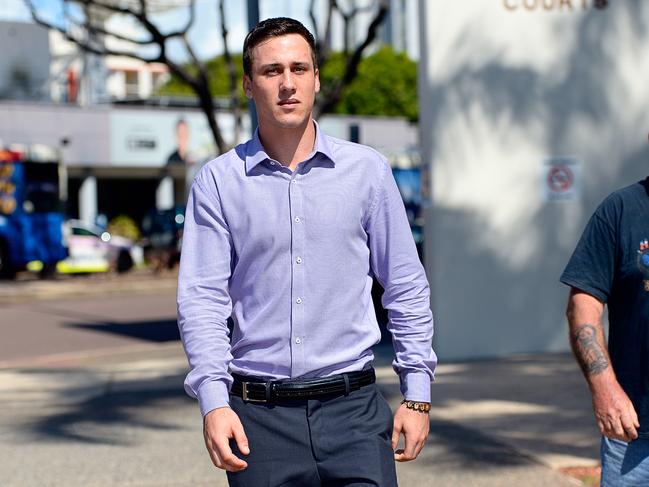
The McDonald’s worker fled the scene of the accident, dumped the car, and was filmed on CCTV later that night buying cigarettes and a novelty propeller hat.
He served three years of his sentence in the Northern Territory before being transferred to Risdon Prison in July 2019 to be near his family.
In his written application for parole, Auton said he was remorseful for his offending behaviour, and on interview by the board, “appeared genuine in his recognition of the impact on the victim’s family”.
He stated a desire to remain drug-free and commented that he believed “over the last three years I have changed as a person”.
“The applicant appeared motivated to move forward with his life, gain independence and security through appropriate employment and not return to his previous drug-related offending and behaviour,” the parole board said.
Auton, who said he had been drug-free since he was incarcerated, has been ordered to continue alcohol and drug counselling throughout the remainder of his parole until April 2022.
E M B
Eligible to be considered for parole on October 10, 2019
Paroled on March 18, 2020
EMB was sentenced to four years’ imprisonment with a non-parole period of two years for maintaining a sexual relationship with a young person.
EMB, who can’t be named for legal reasons, was convicted by a jury of maintaining a sexual relationship with his victim over a period between early 2015 and May 2016.
The victim was a teenage girl aged between 13 and 14 at the time of the offending, who had initially been in a relationship with EMB’s son and was known to him.
In comments on passing sentence, Justice Michael Brett noted that a significant aggravating factor in EMB’s offending was the “breach of trust” involved in the conduct, as he had been acting as a father figure to the victim and her family.

Notes provided to the parole board were positive, indicating that EMB is “hard working and polite”, with no internal offences recorded.
He was employed in several positions within the prison, including wardsman, general hand and was recently promoted to leading hand in the prison store before his release.
A report from the New Directions program suggested EMB’s offending was opportunistic in nature and “appeared to be driven by avoidance behaviours and poor attempts to manage varying emotional states”.
At his parole hearing, EMB stated he had benefited from the program, having learnt the need to express his emotions more and communicate with family better.
“He expressed a willingness and understanding of the need to continue to work with a psychologist in the community to address identified risk factors regarding his offending,” the parol board said.
The parole board said they granted EMB parole because of his “strong family support, willingness to engage in ongoing therapeutic interventions, and supervision and management of identified risk factors by Community Corrections”.
He must obtain a mental health plan from a General Practitioner and attend psychological counselling as recommended by the plan.
ROBERT FREDERICK BOWDEN
Eligible to be considered for parole on October 3, 2019
Paroled on February 5, 2020
Robert Frederick Bowden was sentenced to eight years’ imprisonment with a non-parole period of five years for the 2014 manslaughter of Carmel Nettlefold.
At the time of sentencing, Justice Shan Tennent said Bowden had been jailed many times before but continued to reoffend.
Ms Nettlefold, 71, was standing on a traffic island waiting to cross New Town Road at the intersection of Argyle Street when, for no reason, Bowden suddenly shoved her violently with both hands in the chest on October 4, 2014.
The force of the push caused Ms Nettlefold to fall backwards and hit her head on the road.
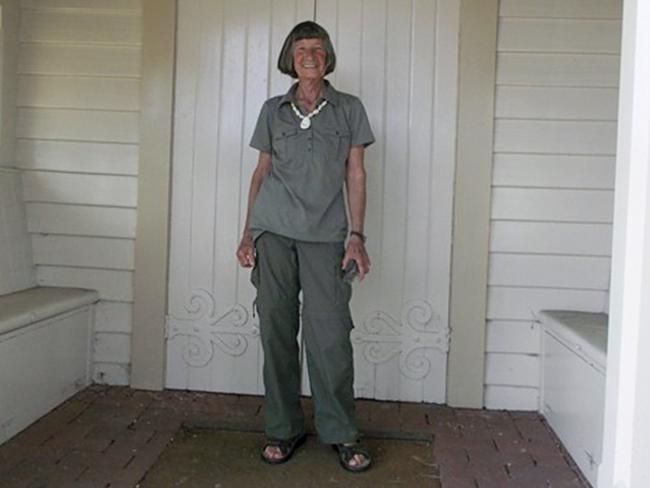
The court heard Bowden, who had mixed alcohol and valium the night before, made no effort to check on his victim before fleeing.
Ms Nettlefold was treated at the scene and taken by ambulance to the Royal Hobart Hospital, but her condition deteriorated and she died from her injuries four days later.
The parole board described Bowden’s behaviour towards Ms Nettleford as “sudden, inexplicable, unprovoked and with disastrous consequences for his victim and her family”.
It also acknowledged “the risk that he poses to the community will very much depend upon” his ability to remain abstinent from alcohol.
In its decision, published online, the board said Bowden’s alcoholism was linked to his prior offending history, which included a number of violence and dishonesty matters.
“It is the applicant’s assertion, which the board accepts, that he has the maturity, skills and desire to maintain this sobriety once returned to the community,” the decision reads.
“While there is a significant history, and therefore future risk of this applicant engaging in violence in the community, he has nevertheless demonstrated insight into his risk factors and has developed a solid plan to avoid and/or withstand those risk factors.”
It was noted Bowden had served his custodial sentence in a “reasonable and compliant manner”, achieving a minimum classification.
He also engaged with vocational coursework, therapeutic programs and counselling.
Bowden will be subject to the parole order, which includes liver function tests, until October 23, 2022.
DGE
Eligible to be considered for parole on December 31, 2010
Paroled on March 18, 2020
DGE was sentenced to 20 years’ imprisonment with a non-parole period of 10 years and nine months on charges of murder, arson and common assault.
The man, who cannot be named as he was 17 at the time, helped Leigh James Butwell and Michael Adam Thompson lure Paul “Joey” Jarman to a remote bush track near Mt Direction in March 2000 before they killed him with a pickaxe handle, shovel and knife.
The Parole Board of Tasmania released the man from Risdon Prison on March 18 – with less than a year remaining on his 20-year sentence – noting he was “highly institutionalised having spent the whole of his adult life in prison”.



When the trio was jailed, Supreme Court judge Peter Underwood said Thompson was motivated by jealousy, starting a relationship with Mr Jarman’s girlfriend the night after the murder.
The board noted Justice Underwood’s comments that the youth wasn’t the instigator of the attack, but became a “willing participant” as the trio caused “horrific injury” to Mr Jarman’s head and body.
The board said the man had a “lengthy internal offending history” related to discipline and behaviour, including swearing at correctional staff.
“It is notable however that the applicant’s internal offending has significantly reduced in the latter part of his sentence, and case notes reflect no internal offences since mid-2017,” the decision said.
“The applicant has engaged in educational opportunities to improve literacy and numeracy throughout his period of incarceration, in addition to speech therapy for a period.”
“Given the significant time the applicant has spent in prison, the board is of the view the applicant needs to be supported in re-integration into the community,” it said.
DEE-JAY FEIL
Eligible to be considered for parole on November 21, 2019
Paroled on February 19, 2020
Dee-Jay Feil was sentenced to seven years’ imprisonment with a non-parole period of three years and six months after pleading guilty to manslaughter.
A night of fun and eight-ball turned tragic when the then-19-year-old stabbed his best friend in the leg at Pontville on May 22, 2016.
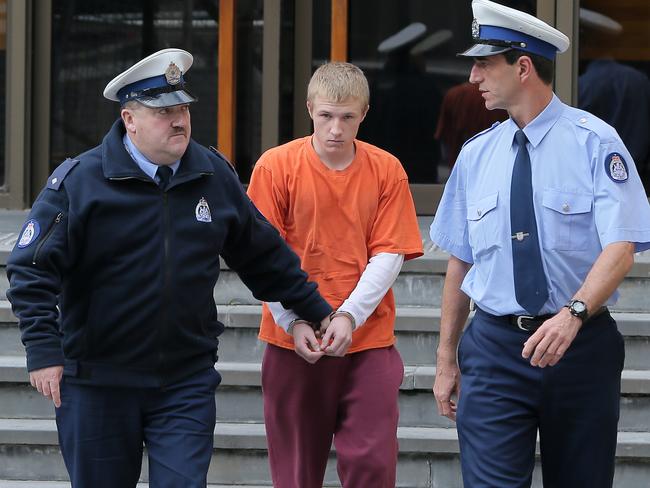
Feil had unknowingly severed Zachary Hyde’s femoral artery with a black-handled steak knife, and the 20-year-old died in hospital two days later with a brain injury caused by blood loss.
The maximum-security prisoner’s freedom came despite him being caught trafficking drugs with another inmate and possessing unauthorised items behind bars.
The board noted the youth’s remorse, family support and positive engagement with anger-management and drug programs before releasing him.
However, he must follow special conditions not to contact Mr Hyde’s family or enter a “defined location” in the state’s South.
The board also noted Feil would need ongoing alcohol, drug and mental health support.
The board said it took Mr Hyde’s family into account before granting Feil parole.
“The impact of the applicant’s offending behaviour on the victim’s immediate extended family has been significant, they have suffered the loss of a young father and partner, and a beloved sibling and son,” the decision reads.
“Nothing can be done to alleviate this loss. Statements made on behalf of the family provided to the Board have been carefully considered when determining the eligibility of this applicant for parole.”
WAYNE ANDREW FENTON
Eligible to be considered for parole on February 25, 2020.
Paroled on February 25, 2020
Wayne Andrew Fenton was sentenced to two years’ and six months’ imprisonment with a non-parole period of 15 months after pleading guilty to one count of causing grievous bodily harm by dangerous driving.
He was jailed more than 14 years after he put a man in hospital in a drunken crash that left the wreckage of four cars strewn across the Tasman Bridge on September 28, 2004.
Returning a blood-alcohol reading of 0.14, he later told police he had consumed six to eight glasses of Cascade Draught and six Valium tablets during the previous 24 hours.

The court heard at the time of the crash, Fenton’s Holden Commodore was travelling up to 85km/h on the wrong side of the Tasman Bridge about 6.45pm with no headlights on.
“[Fenton’s car] moved into the lane of oncoming westbound traffic,” the prosecutor told the court.
“Shortly after, it collided with a black Hyundai hatchback that was travelling west.
“The Commodore then collided heavily with a gold Gemini, which was being driven by the complainant. The impact with the Commodore caused the Gemini to move into the left-hand westbound lane, where it collided further with a Ford sedan.”
The court heard the man in the Gold Gemini spent more than half an hour stuck in his car before being rushed to hospital.
He suffered “significant injuries”, including a traumatic brain injury, spine and pelvis fractures, and several breaks in his right leg, foot and arm — many of which required surgery.
In a victim impact statement, the man in the Gold Gemini said he spent a week in the ICU after the crash and then a further six weeks in hospital to recover.
After his release from hospital, he also spent time in a wheelchair and weeks in rehab.
During sentencing, Justice Michael Brett acknowledged Fenton had a serious problem with alcohol at the time of the 2004 crash and that his drinking habits had spiralled out of control due to a bitter break-up.
However, the parole board noted that the Fenton reported the crash was a “catalyst for him to significantly reduce his alcohol consumption” in the years prior to his eventual incarceration.
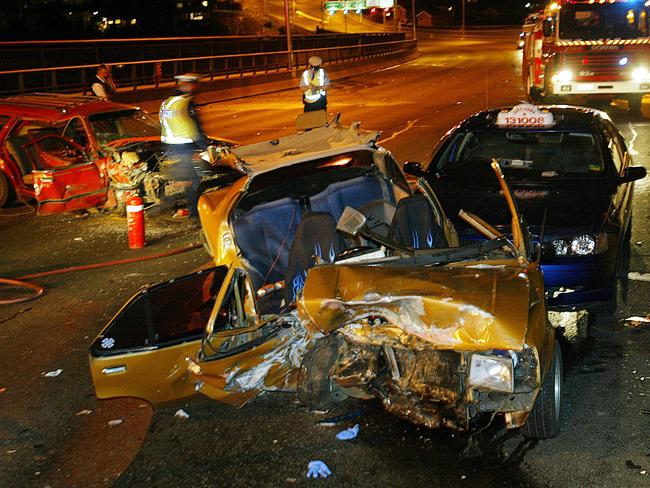
During his custodial sentence, the applicant was classified as minimum security and case notes provided to the parole board were of a positive nature, with no internal offending recorded.
He was employed as a general hand in the prison kitchen and completed several vocational courses, including traffic management, construction and mental health first aid to assist him in obtaining employment on release.
He also took part in a program aimed at addressing substance abuse, allowing him to “reflect on his past behaviour and recognise how his abuse of alcohol has negatively affected his life”.
“On interview by the board, the applicant appeared genuine in expressing the significance of his offending behaviour and despite no intent to injure anyone, showed good insight into the effect of his actions on those involved in the collision,” the parole board said.
“The applicant also recognised he needed to seek ongoing support for his mental health issues and expressed willingness to engage in appropriate interventions.
“The applicant is in a stable relationship and prior to his incarceration was very supportive to his partner who has her own health issues. They are currently engaged to be married.
“Upon release the applicant would return to a prosocial and supportive environment.”
DAMIEN PAUL FORD
Eligible to be considered for parole on March 8, 2020.
Paroled on March 16, 2020
Damien Paul Ford was sentenced to three years’ imprisonment with a non-parole period of two years after pleading guilty to causing grievous bodily harm.
Damien Paul Ford, a recidivist offender with a history of “irrational acts of violence”, punched a stranger unprovoked at a Hobart drinking spot in April 2016.
The man’s jaw was broken in two places and he needed surgery to insert plates and screws after the random assault.
The board said it first granted Ford parole in July 2019, but he was locked up again due to noncompliance with his conditions and subsequent offending.
He was on March 16 granted parole a second time, but must spend the next year in the 24/7 Velocity Transformations residential program, designed to help people recover from addiction and other life issues.
Noting his “extensive criminal history, including for matters involving significant violence”, which had led to several sentences of imprisonment, the board said Ford had endeavoured to focus on his rehabilitation while in custody.
“The applicant’s apparent motivation to lead a prosocial lifestyle were considered by the board in granting the applicant parole from 8 July 2019,” the decision said.
“However, the applicant’s failure to comply with strict parole conditions relating to consumption of alcohol and drugs and consequential offending led to his parole order being revoked.”
But the board said since then, Ford had identified his alcohol and drug use as a mask for mental health issues, and had achieved minimum security classification in prison.
“He expressed strong motivation and desire to be a good member of the community.”
TRAVIS ANTHONY MORTYN
Eligible to be considered for parole on January 16, 2020
Paroled on April 20, 2020
Travis Anthony Mortyn was jailed from September 2017 for two years and six months, with a non-parole period of 20 months, after pleading guilty to aggravated burglary, attempted robbery, demanding property with menaces with intent to steal, and assault.
Kicked out of home as a teen by his “deeply religious” dad after an oppressive childhood marked by punishment, Mortyn was already building a criminal record by the time he unleashed a terrifying home invasion upon a churchgoing family.
Mortyn punched a terminally-ill parishioner in his surgery wound and hit the man’s wife so hard that it fractured her eye socket.
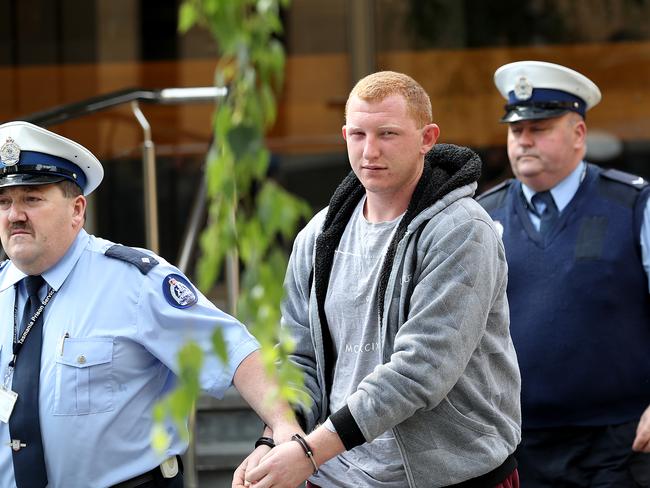
He had another year slapped on his sentence from March 2018, with a non-parole period of six months, after striking a Mt Nelson man with a metal pole in a blow that pierced his kidney.
The parole board released Mortyn from jail after accepting his “genuine” desire to change.
He was initially granted parole in December 2018 and found work, a place to live and a new relationship, but his freedom was revoked in January this year for breaching his illicit substance and curfew conditions.
But the board, noting Mortyn sought help for drug use back in jail and seemed motivated to be a good role model for his partner’s children, said he deserved a “further opportunity for parole”.
In granting his release, the board noted Mortyn’s August 2016 home invasion had a “long-lasting impact” on the family.
The board, which noted Mortyn’s difficult childhood, said he was classified as a minimum security prisoner and any risks of his release could be managed with stringent conditions and therapeutic help.
“He applicant appeared genuine in his acknowledgment that he had a ‘lot to lose’ and had previously made poor decisions that had impacted everyone,” it said.


Meet the talented Tasmanians keeping traditional arts alive
In a world often dominated by consumerism and mass-production, these four talented Tasmanians are finding creative success in traditional arts while also showcasing Tasmania to the world
100 must-do Tassie experiences under $100
The cost of living continues to rise, but Tasmanians still want to get out and enjoy life, especially in winter. Find inspiration in our mega list of 100 distinctly Tasmanian things to do for under $100